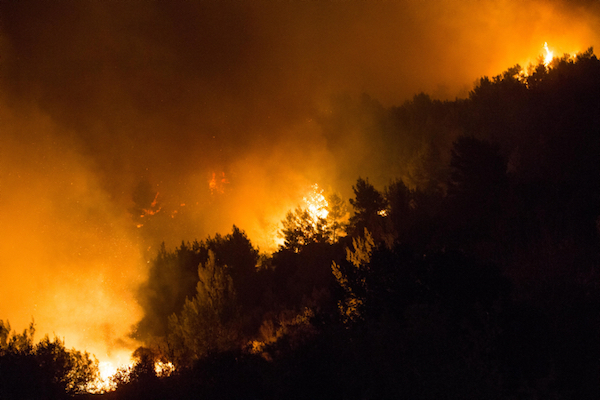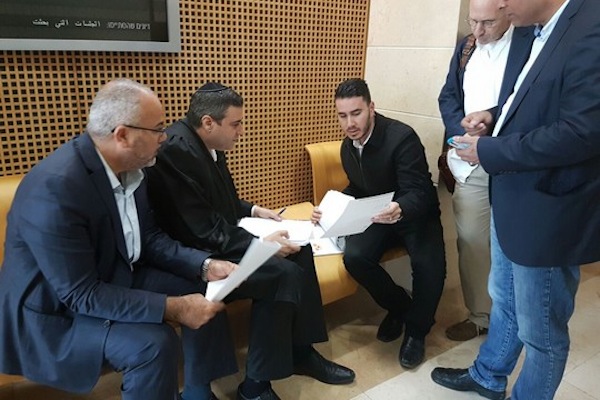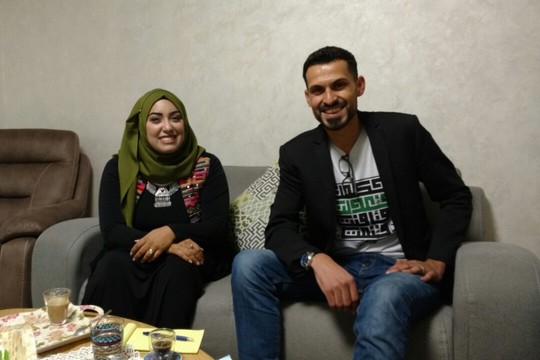Anas Abudaabes, arrested for publishing satirical Facebook posts about people celebrating the wildfires in Israel, talks about how Israeli police tried to humiliate him, and explains why he insists on criticizing Arab society in Israel.
Like Ludvik, the protagonist in Milan Kundera’s novel “The Joke,” Anas Abudaabes has discovered firsthand the problems that arise when a regime lacks a sense of humor or irony. Yet Abudaabes, unlike Ludvik, has not lost his own sense of humor, even following his Kafkaesque arrest last week for writing an ironic Facebook post lampooning those who celebrated the fires that were raging across Israel.
When he greets me at the door of his home in Rahat, I tell him that when a prisoner is released, it’s Jewish tradition to say, “Baruh podeh asirim” (Bless the redeemer of prisoners). To my surprise, he shot back the traditional response in Hebrew.
Since his release from jail on Sunday evening, Abudaabes and his wife of three months, Ruqayya Sabah, have primarily dealt with receiving visitors and well-wishers. He is a journalist and social activist, she is a Master’s student researching immunology and cancer at the Hebrew University in Jerusalem. “They’ve organized a honeymoon for us,” Ruqayya says.
The couple are clearly exhausted, but they are kind and generous hosts, reconstructing the bizarre chain of events that led to Abudaabes being detained for days after writing a Facebook post that ended with the hashtag “#Satire_not_serious”.
“I wrote the statuses after I’d finished work that day, almost spontaneously. It’s not like I sat and thought about them for an entire day beforehand,” Abudaabes says. “The mockery was supposed to be offensive to those it was aimed at. It’s like how you can’t tell Holocaust jokes in Arabic — the cultural context is not there. It’s the same here: they [Jews — o.n.] read the Arabic but didn’t understand; it’s so far from their narrative that they don’t get it.”
‘Drink petrol’
An hour after Anas had written the second post, “the most incriminating of all,” three plainclothes detectives showed up at the Abudaabes’ home, armed with a search warrant. “Fifty-three minutes after,” Ruqayya specifies. “The post had received fewer than 100 ‘likes’ by that point.”
“At first I still thought this was a minor misunderstanding that would be cleared up after I explained it to them,” Abudaabes says. “But when they asked for our computers I realized it was more complicated than that. When I tried to ask them why they needed the computer, they yelled at me, ‘Oh, so you’re refusing to cooperate?’ And then I really panicked.”
After the detectives had finished turning the house upside down, they insisted on taking Abudaabes — with his hands and legs in cuffs — to the shared office where he has his own workspace. Abudaabes is convinced that their intention was to humiliate him in front of the other office members.
Over the next three days, Abudaabes says, efforts to humiliate and frighten him became a recurring theme. “I arrived at the station not quite ready to spend the night there,” he recalls. “It was very cold and I asked them to close the door, so they shouted: ‘You’re cold? No problem, we’ll burn a forest here right away so you can warm up’.”
“When I asked for a glass of water, they responded, ‘Why water? Wouldn’t you prefer petrol?’ I felt as if they were trying with all their might to unnerve me, to make me explode. I had to exercise a lot of self-restraint,” Abudaabes says.

Why you, of all people? Is there any reason to think they were ‘searching’ for you?
“After the first interrogation in Rahat, the investigator told me, ‘Listen, you have problematic family ties (Abudaabes’ uncle on his mother’s side is the head of the southern branch of the Islamic Movement — o.n.).’ I assume it’s also connected to my activism, including my opposition to the Prawer Plan.”
It may also be worth remembering that Abudaabes has thousands of Facebook followers — an audience the police would certainly be aware of, and to which they may be attempting to send a message by way of Abudaabes’ baseless arrest.
From the moment of his arrest until he was brought before a judge for the first time on Friday afternoon, Abudaabes was completely isolated and knew nothing of the media squall that his arrest had stirred up.
“I was very surprised when I realized that the prison wardens knew about my case; I heard them saying, ‘What, that’s the guy from Facebook? They still haven’t released him?’ They even threw out the little personal items given to detainees, like toothpaste, a toothbrush, a small towel — because they didn’t believe that I’d be kept overnight over a [Facebook] status,” Abudaabes says.
‘Google doesn’t back your story’
When he arrived at the courtroom, Abudaabes was astounded to find it packed to the rafters with journalists, Knesset members, relatives, friends and other supporters. Just before Abudaabes was brought in himself, the warden asked him if he wanted to cover his head with a coat. “For a second I didn’t understand,” he says. “What, am I some murderer who needs to cover their head in court? But then I realized two things — one, in order for me to cover my face myself he would need to take off my handcuffs, and I didn’t want my mom to see me cuffed. And two, if they were going to photograph me like that, I would from now on be an illustrative picture on any item about incitement — even if the trial ended up coming to nothing. So I asked to cover my head.”
The line of questioning that took place during the interrogation and in court to decipher the intentions behind Abudaabes’ Facebook posts, are so surreal that it is hard to believe they occurred at all. “After I explained what I had written a few times, the interrogator at the station in Rahat showed me a Google translation of my status, saying, ‘Google doesn’t back your story’.”
Over several long hours Abudaabes tried to explain Facebook’s inner workings to the interrogators, to the judge and to the prosecutor. “It was clear that he really didn’t understand what I was talking about. He didn’t have a clue what a hashtag is. He asked me, ‘Why do you sometimes say status, and sometimes post’?”
‘I try to write where I can make an impact’

Abudaabes’ desperate attempts to explain himself were no help, and the court extended his detention three times. In the end, the police themselves backed off, agreeing to Abudaabes’ release. “It’s possible that the massive presence of supporters and Arab politicians pressured the judge in the other direction,” Abudaabes muses. “Perhaps he didn’t want them to come out of his courtroom celebrating.”
This story is especially baseless because I would have thought that any backlash would come from Arabs. In both statuses you serve up a scathing criticism of your own society.
“Exactly! It was a huge surprise, because I thought the same thing. Trying to explain the difference between a political struggle against the occupation and happiness over seeing part of the homeland going up in flames is not easy.”
“Sometimes I think it’s a waste of time to attack the right-wing government,” Abudaabes continues. “I can talk about Bibi, about Bennett, but then what? What am I going to change? Most of the time I try to write where I can make an impact. I’m part of the Palestinian community, and the change I can make is from within. If you want to connect with your own society, you have to take risks. Take Arab Knesset members, for example. They mostly do a lot of important work, but they don’t sell their public on it because they spend all their time attacking the [Jewish Israeli] Right,” he adds.
“I know they had something of a dilemma over how to address my situation in the Arabic media, because some of them saw my posts as defending Israel. They objected to these statuses and hoped that this whole business would conclude without their having to publicly support me.”
Although Abudaabes was released on Sunday, he is still under house arrest with certain restrictions. His cellphones and computers are still being held by the police (“I really hope they don’t delete my thesis,” says a concerned Ruqayya), and someone has already taken down the second post — the “incriminating” one — although it’s unclear whether this was the police or Facebook. Abudaabes still cannot access his Facebook account, under court order. The police have finished their investigation and passed on their findings to the prosecutor, who is now supposed to decide whether there is enough evidence to warrant an indictment.
Has anything positive come out of this story?
“I still don’t really understand the scope of the effect this has had. My father was dumbfounded that Arab Knesset members suddenly turned up at our house. Clearly, I’ll want to take advantage of this in order to raise awareness and engagement. All of a sudden my closest family members, who were always afraid of talking politics, are talking about political persecution. People my father’s age who talk about how, as students, they celebrated Independence Day as if it was another holiday on the calendar after Eid al-Adha and Eid al-Fitr have suddenly changed their tune. That really is a very important development.”
This article was first published in Hebrew on Local Call. Translated by Natasha Roth.




